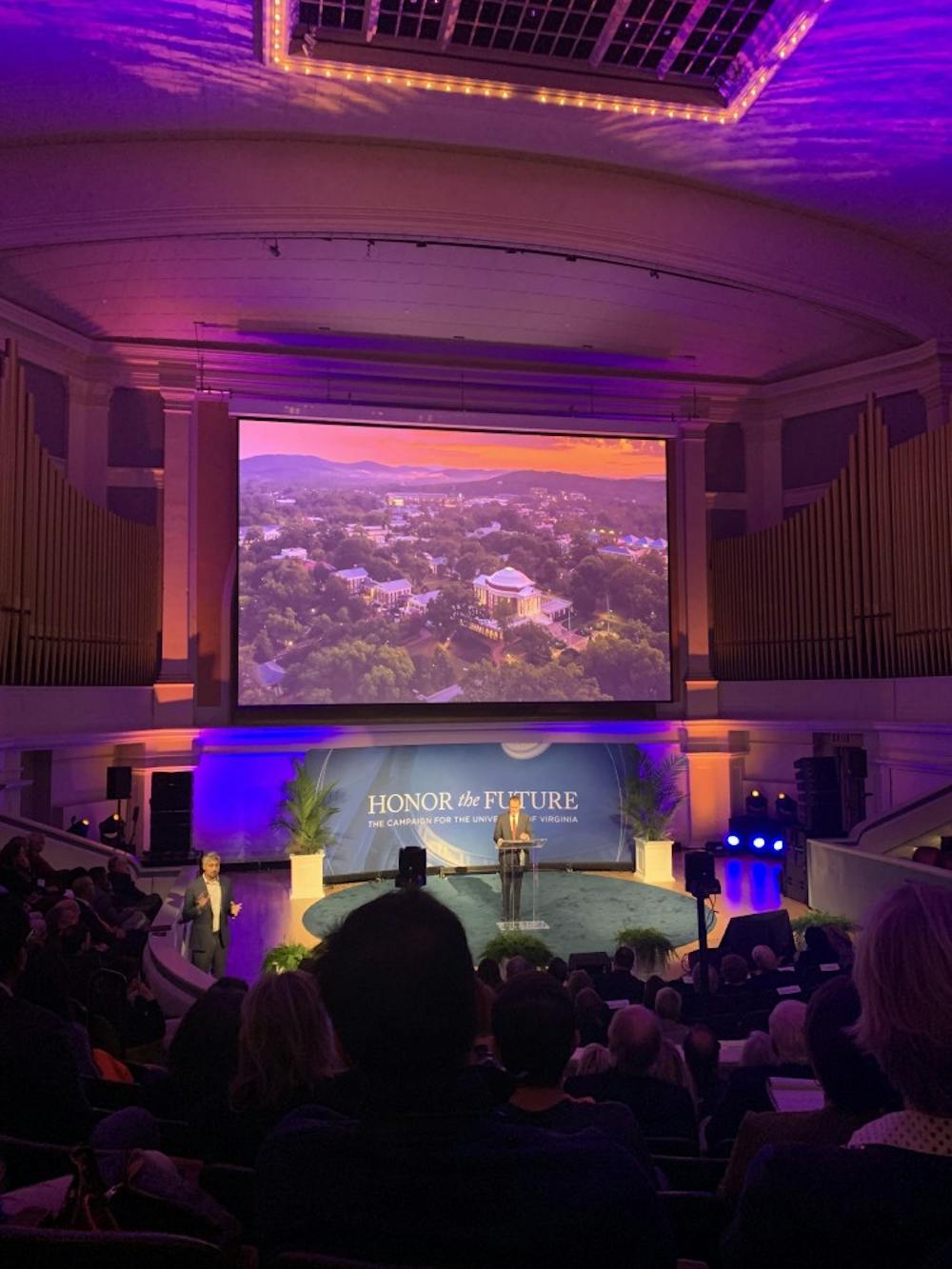University President Jim Ryan delivered his Honor the Future campaign address Saturday in Old Cabell Hall, where he announced that the University has already raised $2.75 billion of its $5 billion goal. The campaign seeks to fund Ryan’s 10-year strategic plan, which aims to establish the University as a leading public school by 2030.
The address was delivered following a Distinguished Alumni Panel, which was moderated by Liz Magill, executive vice president and provost. Panel speakers included Dr. Francis Collins, a graduate of the College and the director of the National Institutes of Health; Chris Long, a graduate of the College, humanitarian and former NFL player; Leland Melvin, a graduate of the School of Engineering and NASA astronaut; and Cheryl Mills, a graduate of the College, former deputy White House counsel to former President Bill Clinton and chief of staff to former Secretary of State Hillary Clinton.
During the panel, alumni reflected on the University’s influence on their lives and expressed their hopes for its future.
Long emphasized how the University challenged him to grow holistically as a student and an athlete.
“You become a complete person — that’s what it takes to succeed in the real world,” Long said.
Mills highlighted the importance of accountability in the University’s student culture. In her remarks, she discussed the importance of getting students “to understand what it means to be an accountable partner, an accountable leader, an accountable individual.”
Collins expressed his hope that the University continues to “expand and nurture an environment that educates visionaries who are truly whole people in terms of their appreciation and understanding — their passion for making the world a better place.”
Alumni also discussed their hopes that the University will continue its efforts to increase accessibility. Long envisions U.Va. as a place where “everybody in the state — everybody in the country — feels like they have an opportunity to attend.”
Melvin alluded to his career as a NASA astronaut when asked about his desires for the University’s future.
“That would be the ability to continue to give people perspective,” Melvin said. “The overall perspective that I had from space changed fundamentally the way I think about everything that I do, and to allow kids from every zip code — no matter what they have or don't have — to come here and see this as a place for any dream made possible.”
“It was very inspiring for me,” first-year College student Lifan Xu said. “The speech motivated me to keep doing what I’m doing and pursue my future.”
Ryan announced the $2.75 billion raised during his campaign address following the panel in a letter “to the not-too-distant future” that opened with an acknowledgement of the University’s history tied to slave labor and denying women higher education, saying “over the years, we have demonstrated time and again our capacity to change for the better.”
Ryan also stressed the importance of higher education for solving the problems the next generation will face, such as global threats to democracy, increasing political polarization, climate change and income inequality.
“In my view, the best way for higher education to meet its own challenges is for higher education to meet the challenges facing our country and our world,” Ryan said. “Higher education that is best helps to solve the world’s problems.”
At the speech’s conclusion, Ryan was joined onstage by members of Hoos First, a student support group for first-generation college students. Standing in front of the group, he discussed his hope for the University to become “not merely more diverse, but also more inclusive.”
Third-year Curry student Nia Augustine is a student intern for first-generation students and a member of Hoos First and said it created a sense of solidarity.
“The event was amazing,” Augustine said. “I definitely felt community within that space, and just looking around the room and knowing that we all have that shared identity of being first-gen. Being first-gen just brings you closer to people that you never talk to.”
Augustine also said Ryan’s remarks about the importance of creating communities and working together to bridge gaps and to strive stood out the most to her.
Last Wednesday, an email was sent to the members of Hoos First requesting that they join Ryan on stage at the end of his speech. According to the email, the gesture was intended as a display of solidarity with first-generation students and to represent how the future of the University lies in their hands.
Some students, however, felt that the request was inappropriate.
“The messaging was that this is a way for them to show solidarity with first-gen students,” said third-year College student Steven Radilla. “But you can do that other ways — not holding them in front of donors for your capital campaign.”
Radilla believes there are alternative approaches to displaying solidarity with first-generation students.
“You can do stuff — material changes for first-gen students,” Radilla said. “There are policies U.Va. could implement that don’t require capital.”
As for expanding diversity and inclusivity, Augustine said that the University is making progress, but that it must be “making sure that we have more diverse faculty and staff — not only student body.”
“It’s one thing for us to have a diverse student body and not have a diverse faculty and staff,” Augustine said. “And diversity — not only in race — but also in the areas of studies. We’re continuously promoting that idea of being not only student leaders but global citizens of the University — and the world.”
Later Saturday night, Ryan announced to a dinner audience of donors and community members that the University received a $100 million gift to support first-generation students, funded by David and Jane Walentas. The gift will allocate $75 million to scholarships to attract first-generation students, and the remaining $25 million will fund fellowships and professorships.







